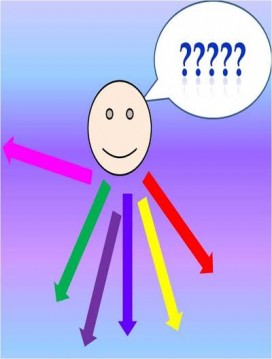
How do you decide?
There are many ways to make choices. Some are unconscious, a reflex really, for example, stopping suddenly as the light in front of you goes red. We choose to press our foot on the brake but we often are not taking a long time to respond to a sudden change in our environment.
Some choices are very conscious. We may make lists of the pros and cons of a particular way forward. We may consult friends, family members, therapists, or experts. We may take the opportunity to meditate or pray or spend some quiet time mulling over what is best for us, for our community, or for our family.
In a commentary on Ezekiel 21:26 it reads, “For the king of Babylon is standing at the fork of the two roads to read the omens: he shakes out the arrows, inquires of the teraphim, inspects the liver,” the United States Conference of Catholic Bishops talk about divination. “Three forms of divination are mentioned: arrow divination, consisting in the use of differently marked arrows extracted or shaken from a case at random; the consultation of the teraphim or household idols; and liver divination, scrutiny of the configurations of the livers of newly slaughtered animals, a common form of divination in Mesopotamia.”
There are many forms of tapping into our intuitive sense about what is the best way forward.
From the field of complementary and alternative medicine comes muscle testing, which can be considered a form of divination or simply a way to access our subconscious mind. In muscle testing a person holds in their mind a thought, a choice, or even a physical substance, while holding out their arm. A practitioner or friend presses on their arm. If the strength of the arm muscles weakens with the thought or substance then it is presumed to be a bad choice or item. If the arm muscles stay strong then it is presumed to be a good choice or beneficial thought.
If the king of Babylon had used muscle testing he may have stood at the fork in the road and imagined himself walking down the path to the right and then tested the strength of his arm and then tested in the same way a visualization of walking down the path to the left. You can also focus on how your body or heart feels as you imagine one choice over another.
In Integrative Manual Therapy there is a technique called motility testing which can be used in a similar way. The practitioner feels for a particular rhythm in the body such as the heart beat then has the client think a particular thought, imagine making a choice in a particular way or touch a food or substance. The practitioner feels for a change in a positive or negative direction and shares that information.
The tricky part is defining what is a positive or negative direction. Typically a stronger, more forceful, smoother, or more calm heart beat is seen as a positive direction while a more erratic, labored or weak heart beat would be considered to be a negative indication of the benefit of the particular choice or substance.
All of these are ways to access what we each know about how to move forward in life in the best way possible. We have the most information about ourselves, our thoughts, our feelings, and our bodies. There is a lot of information we can access as we make choices.






